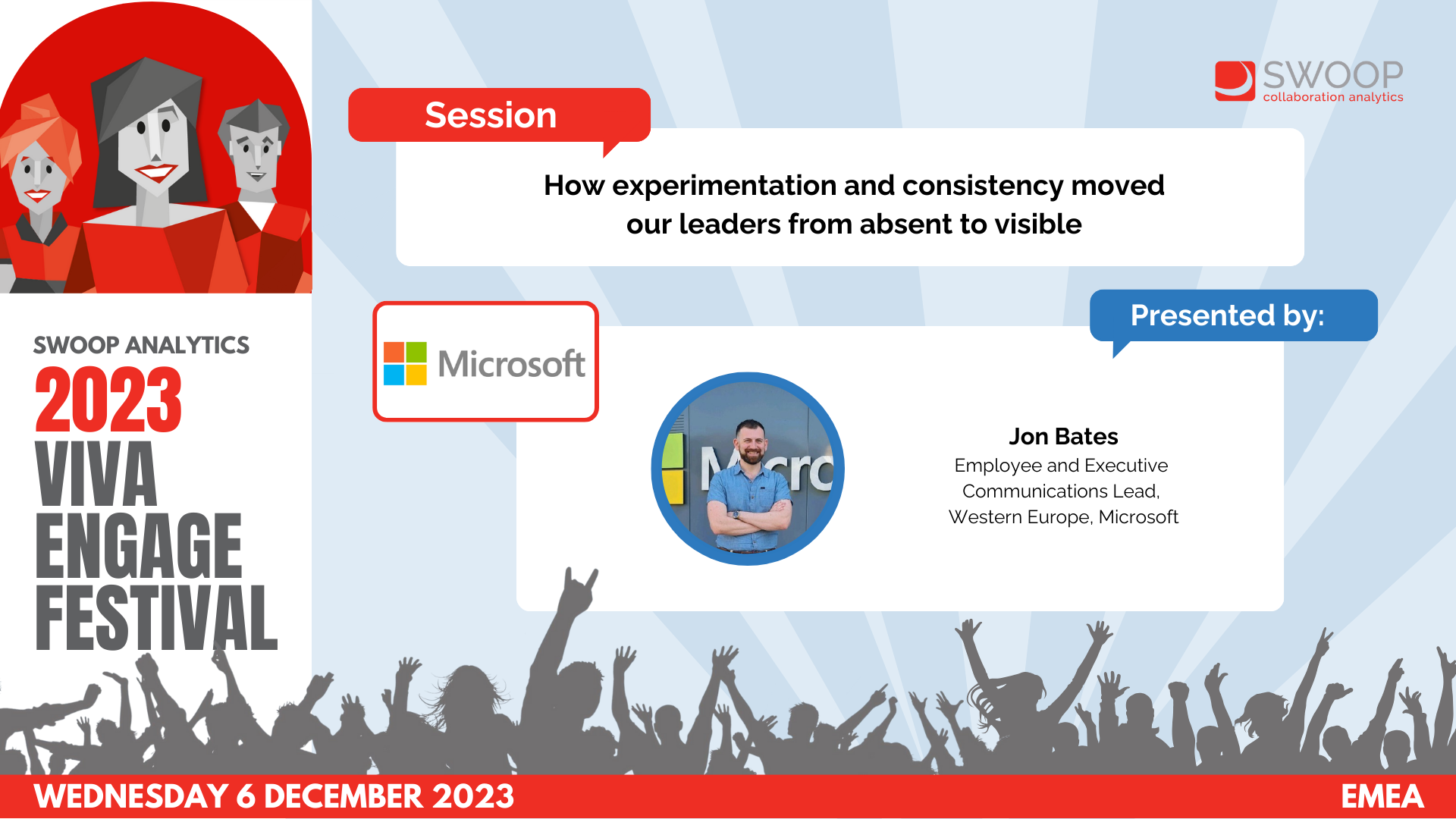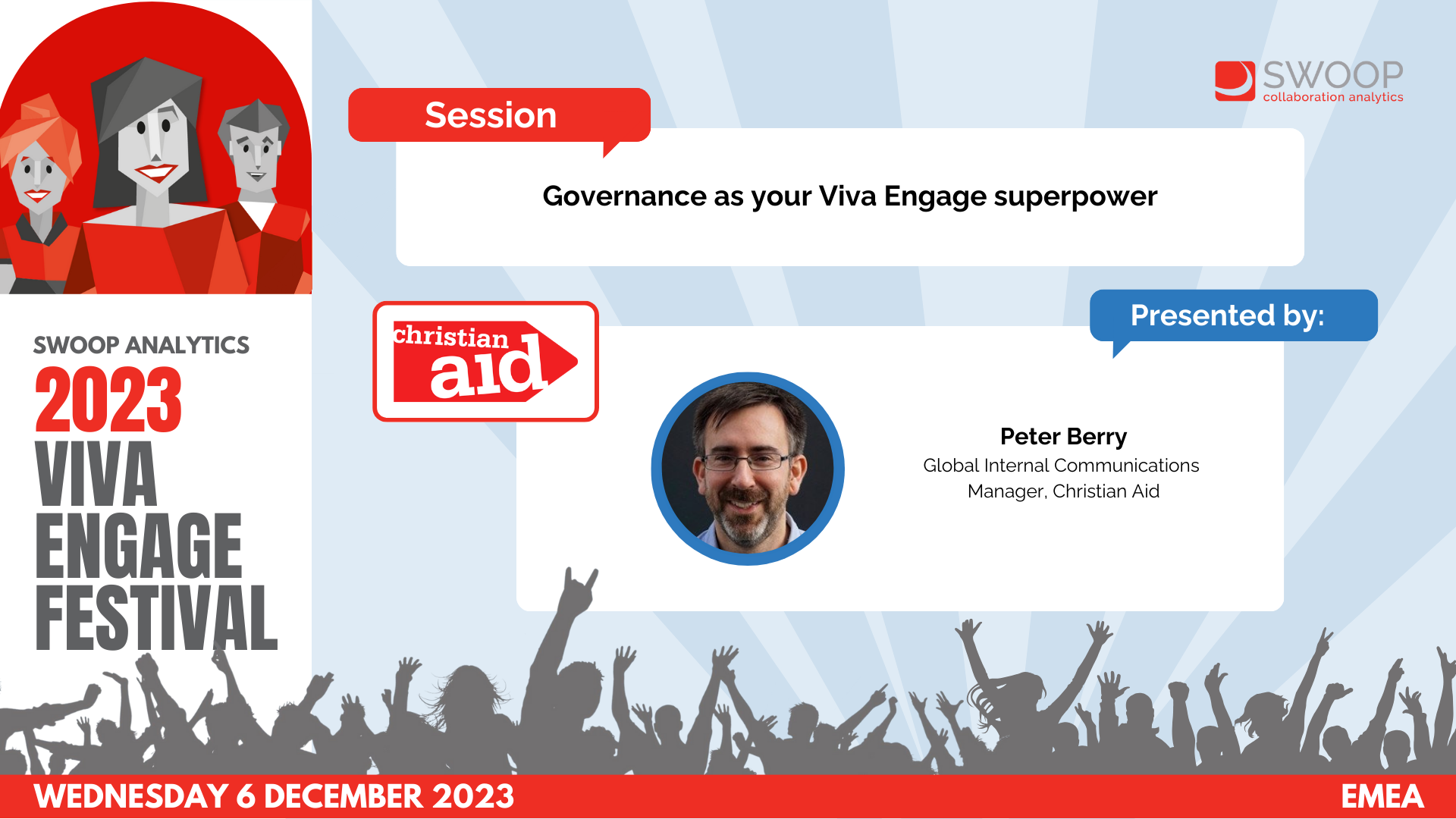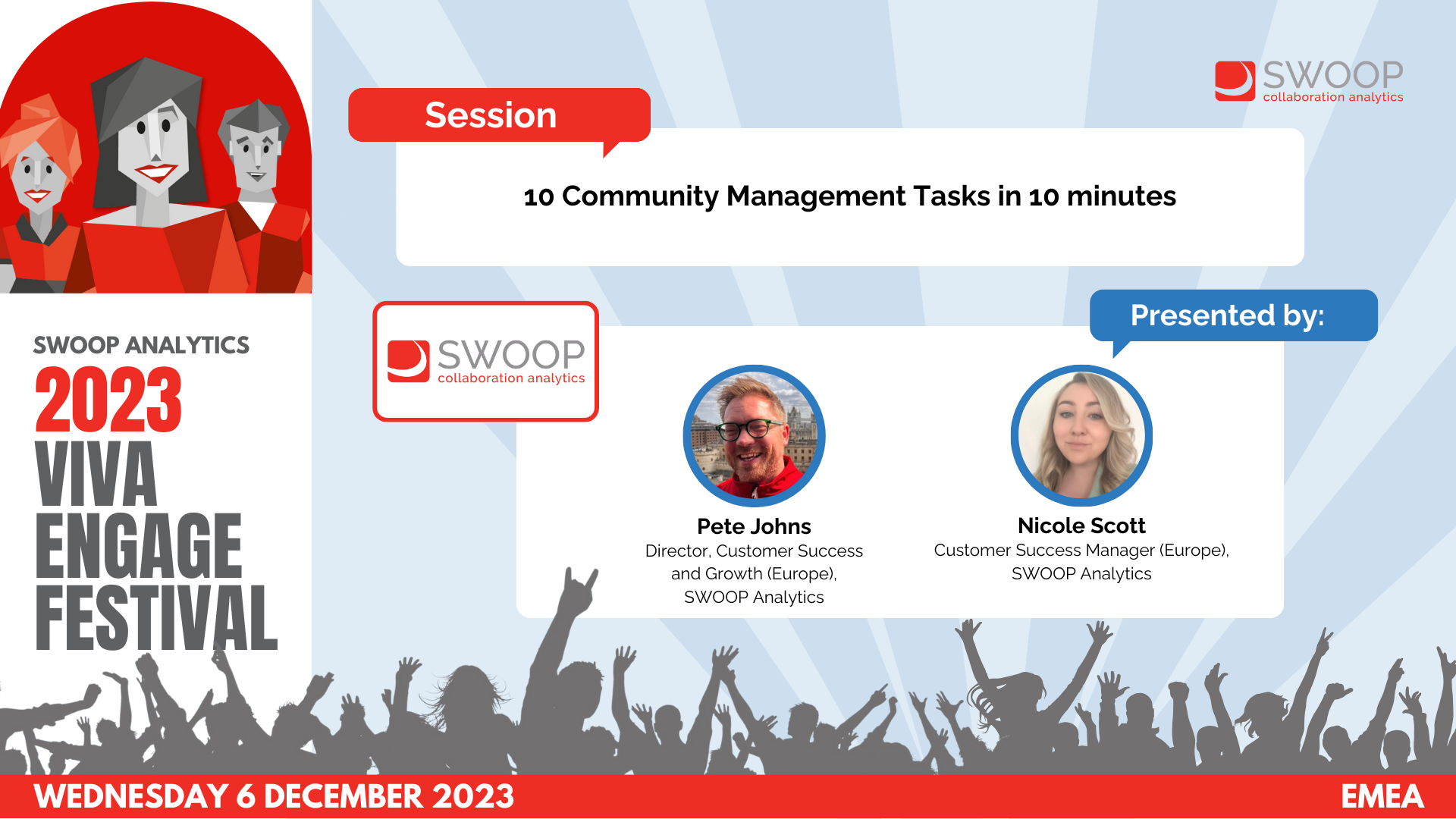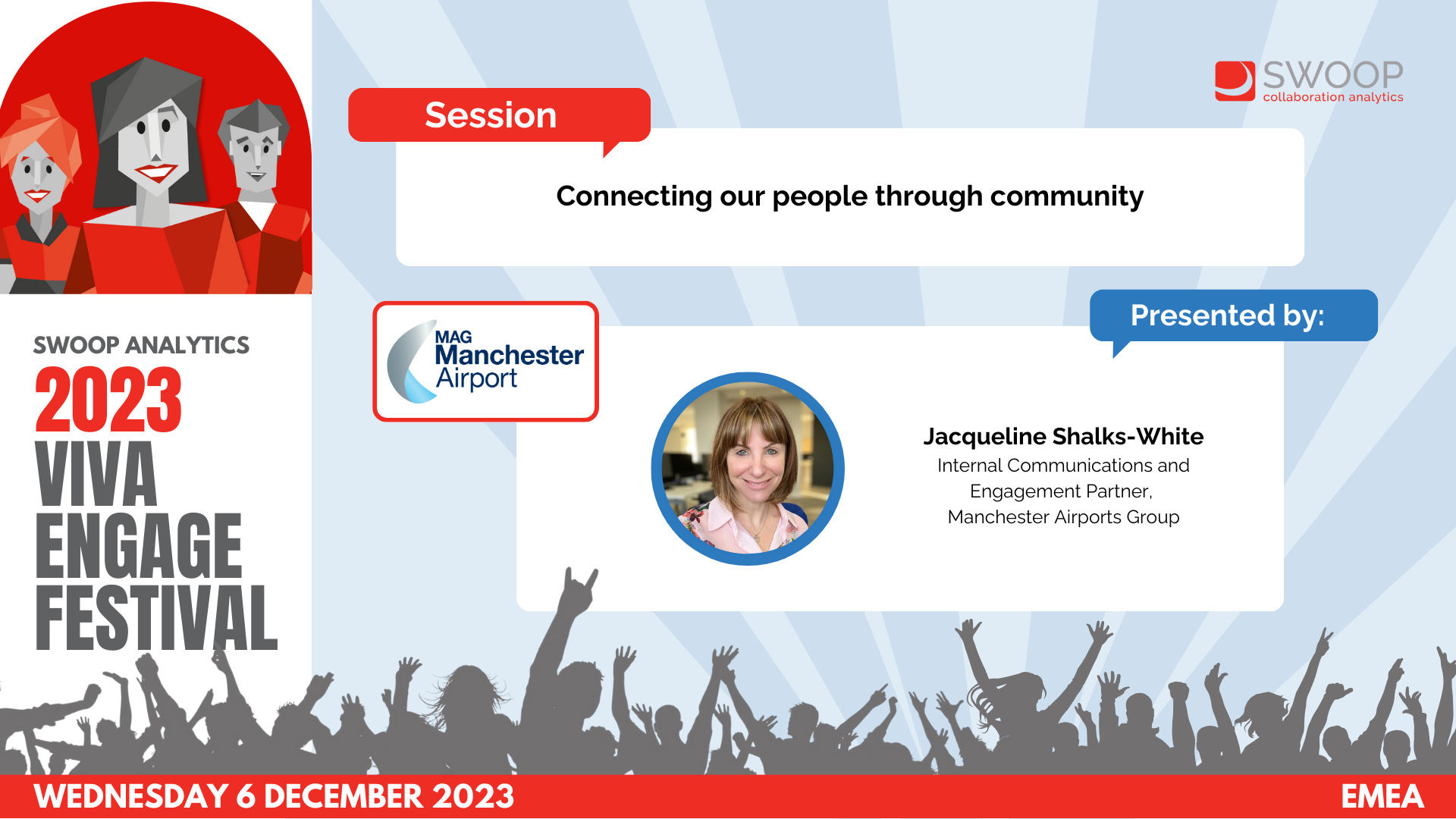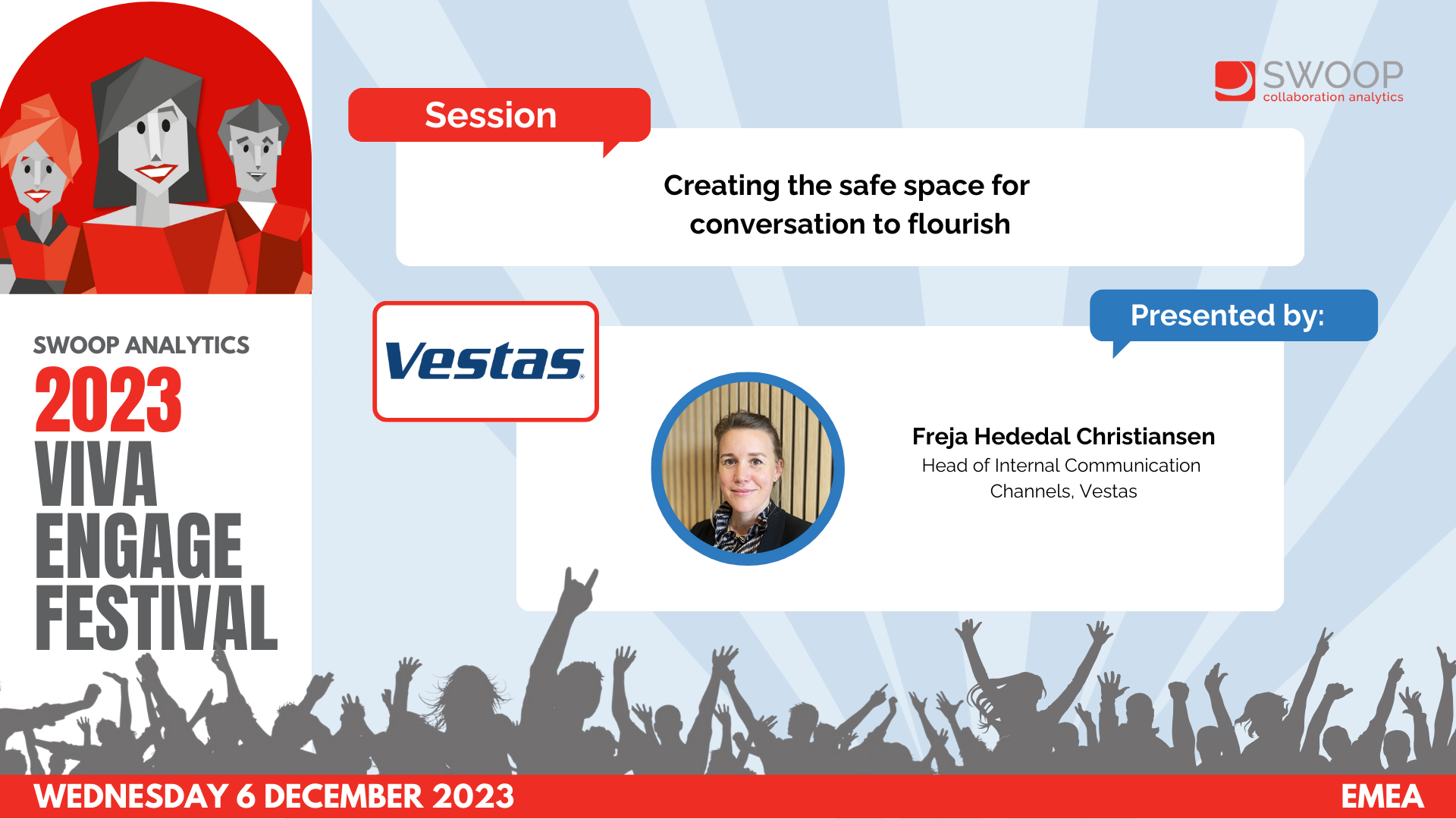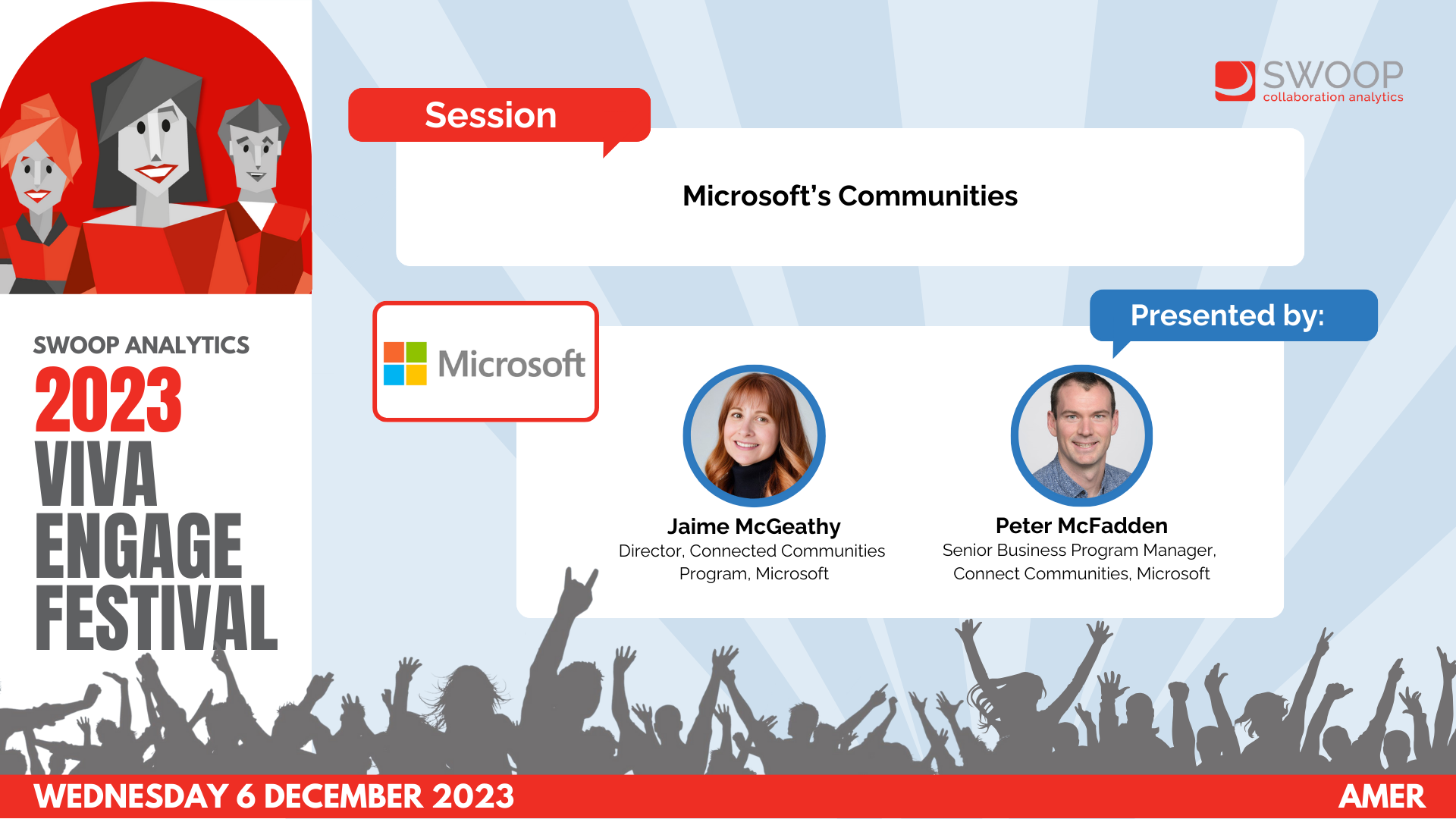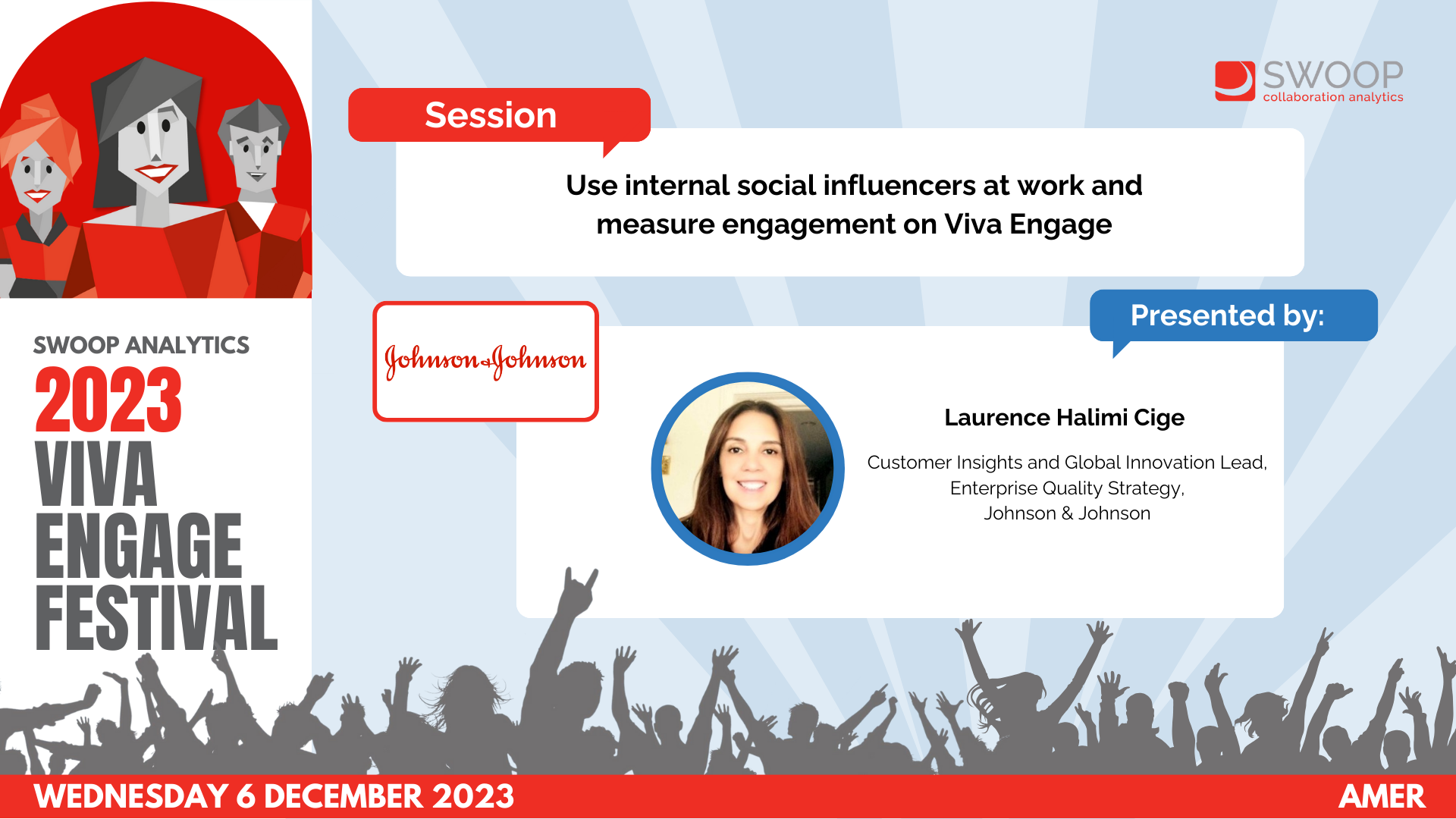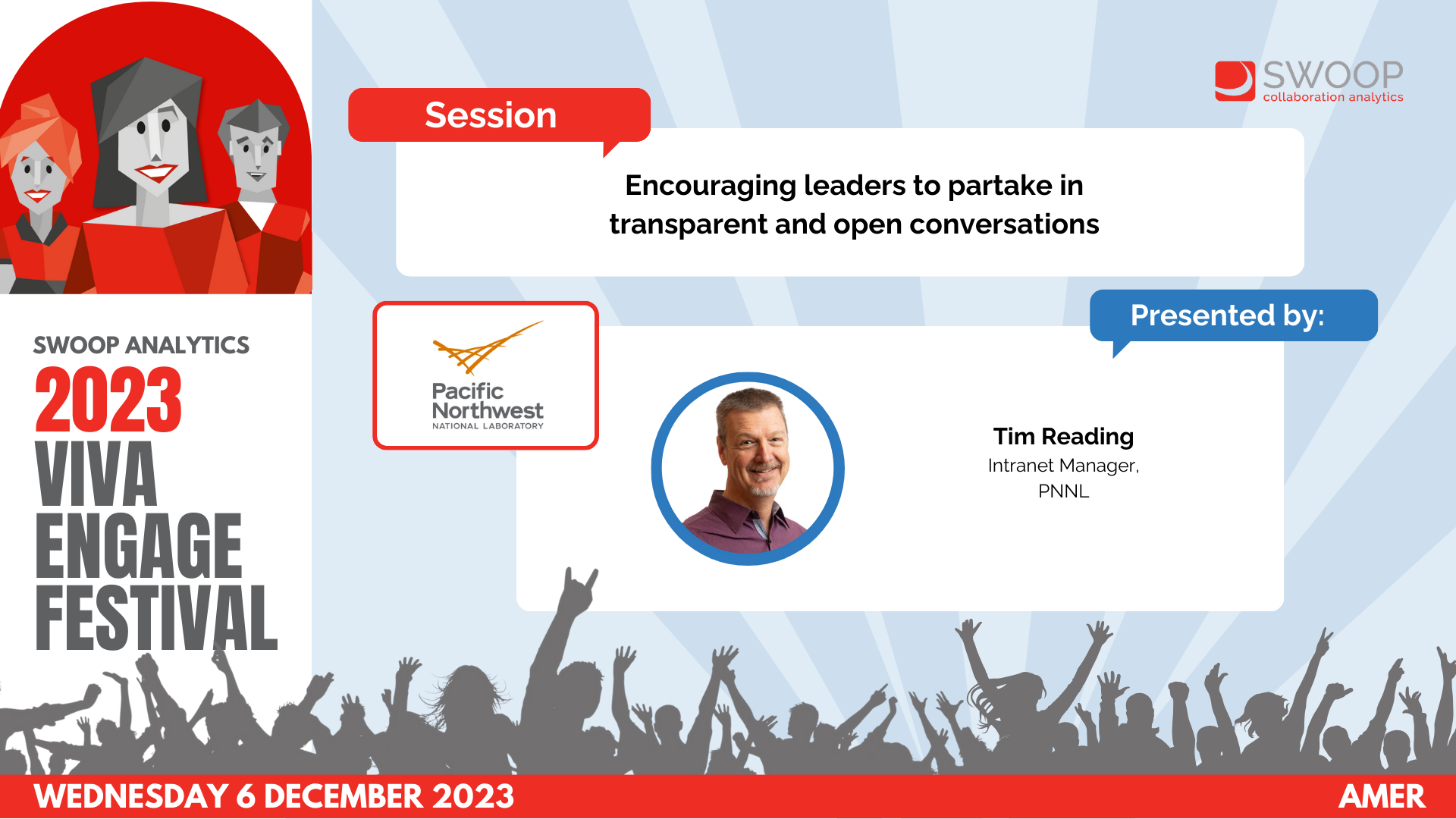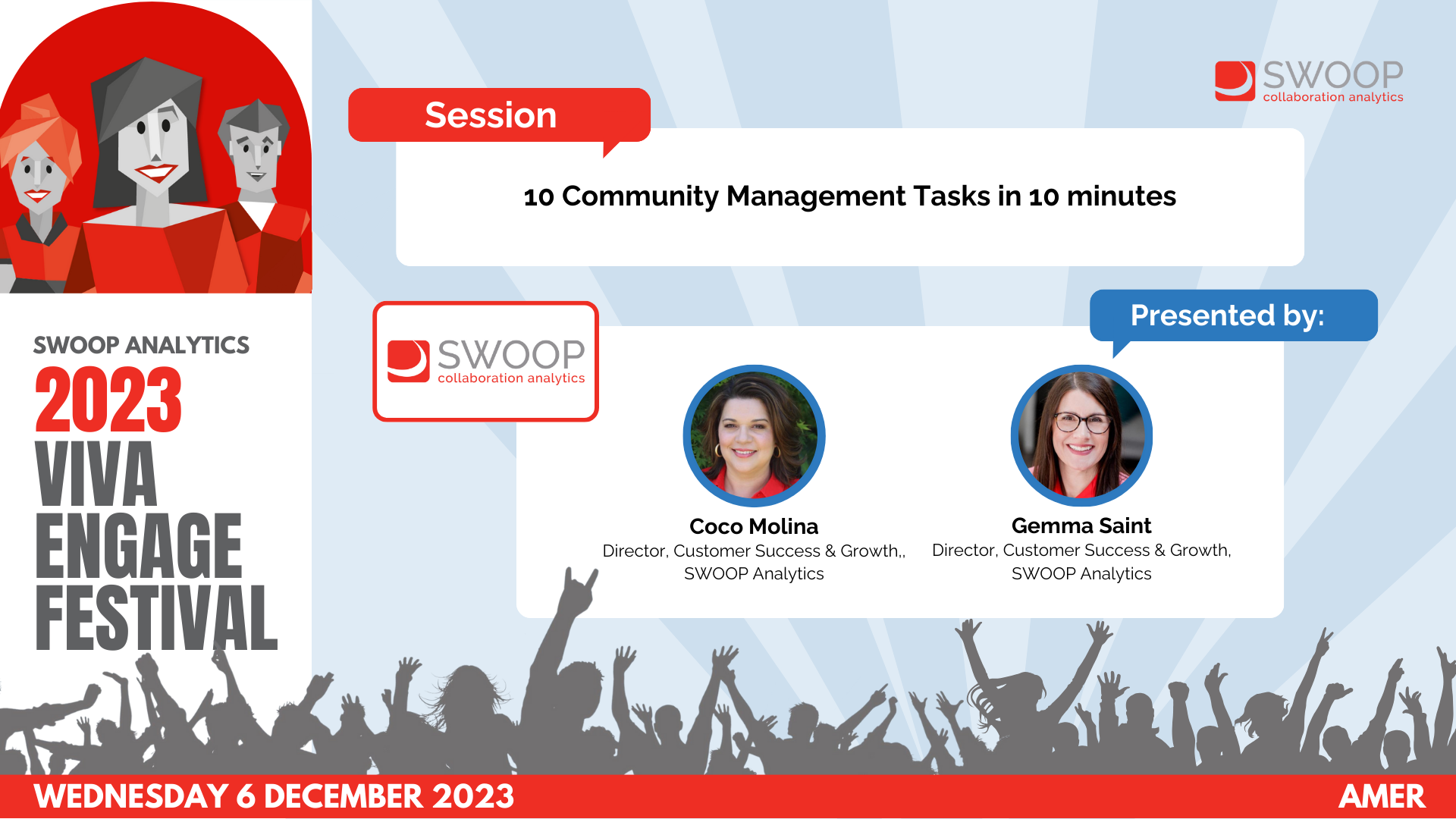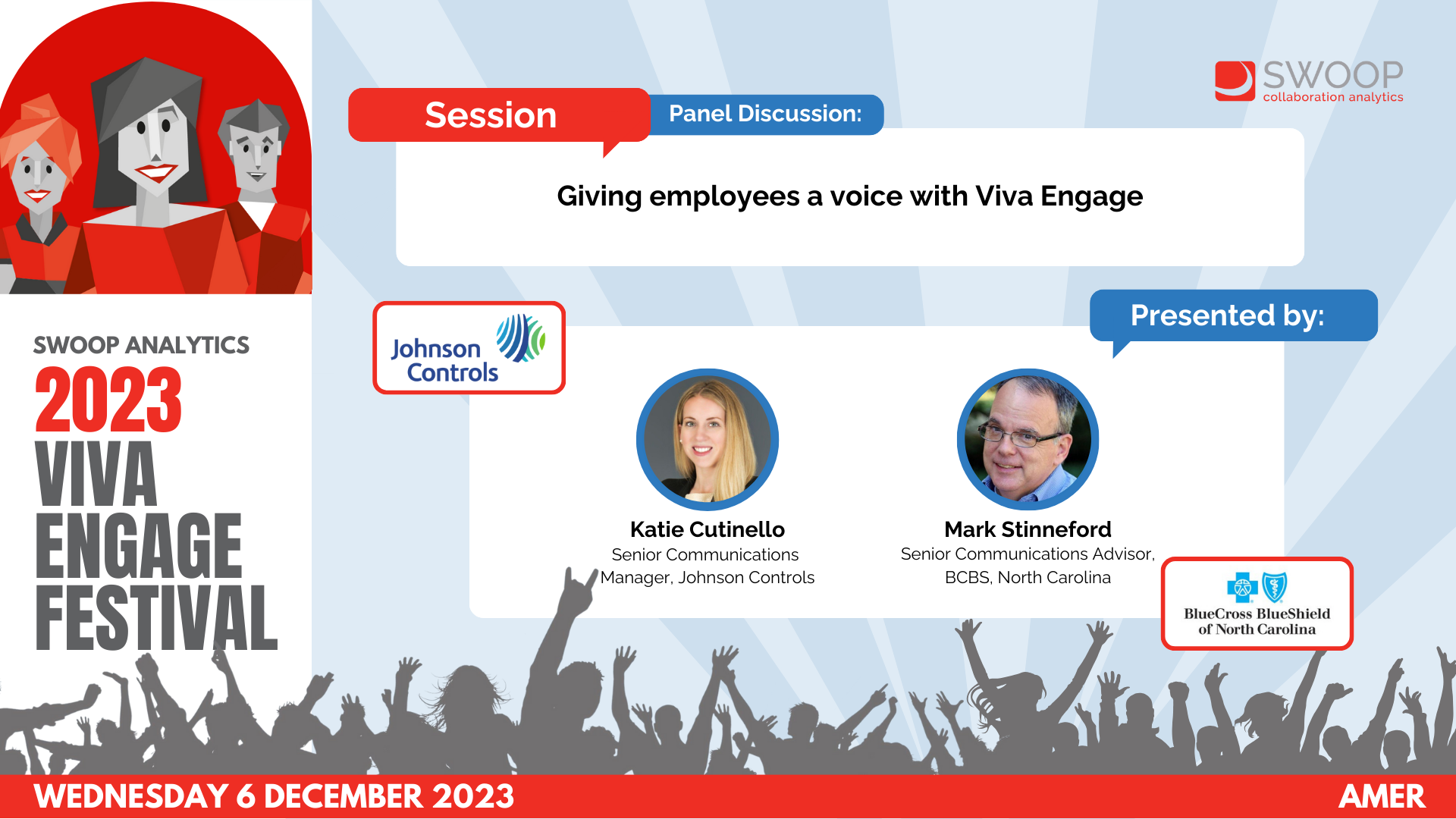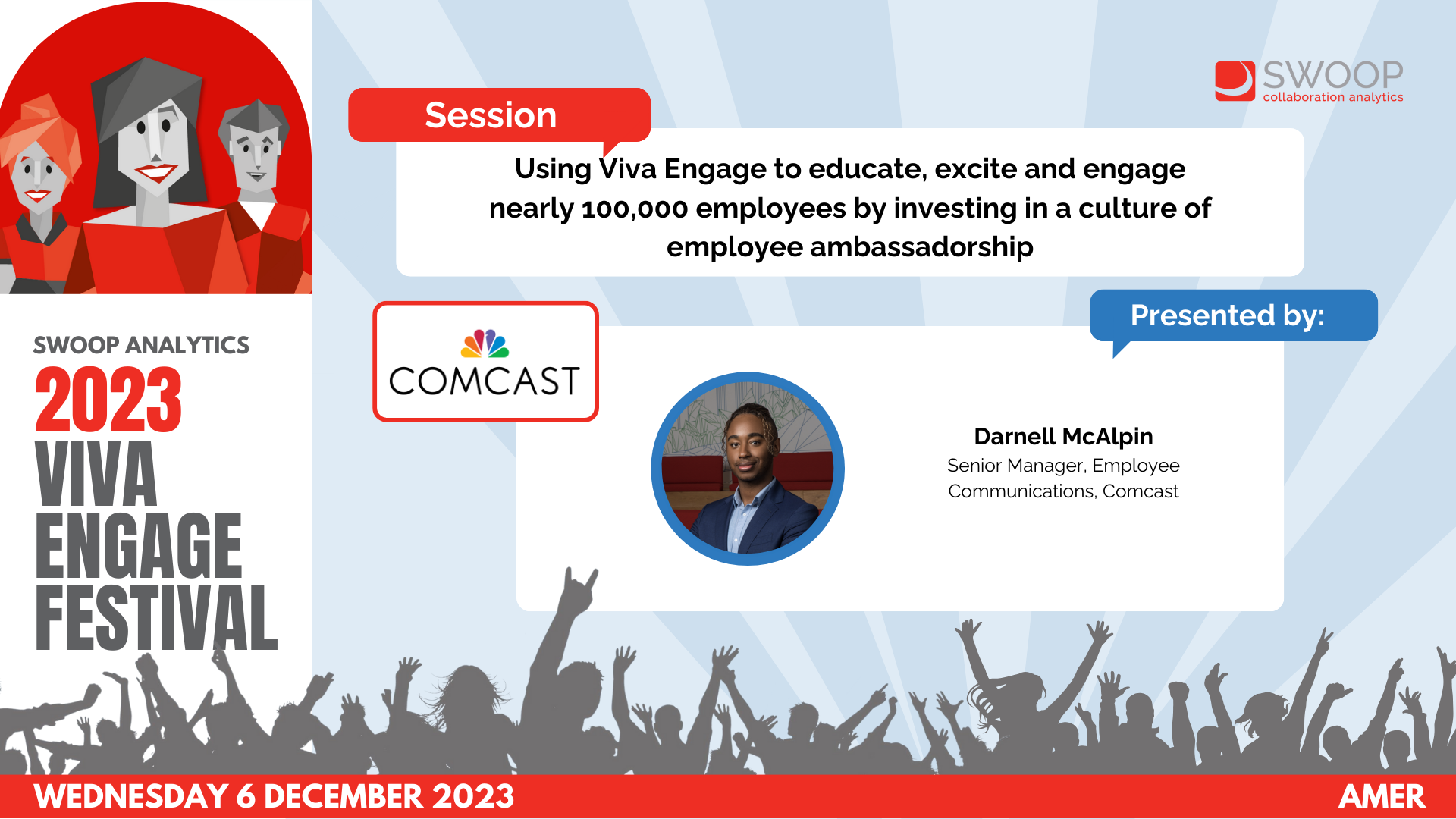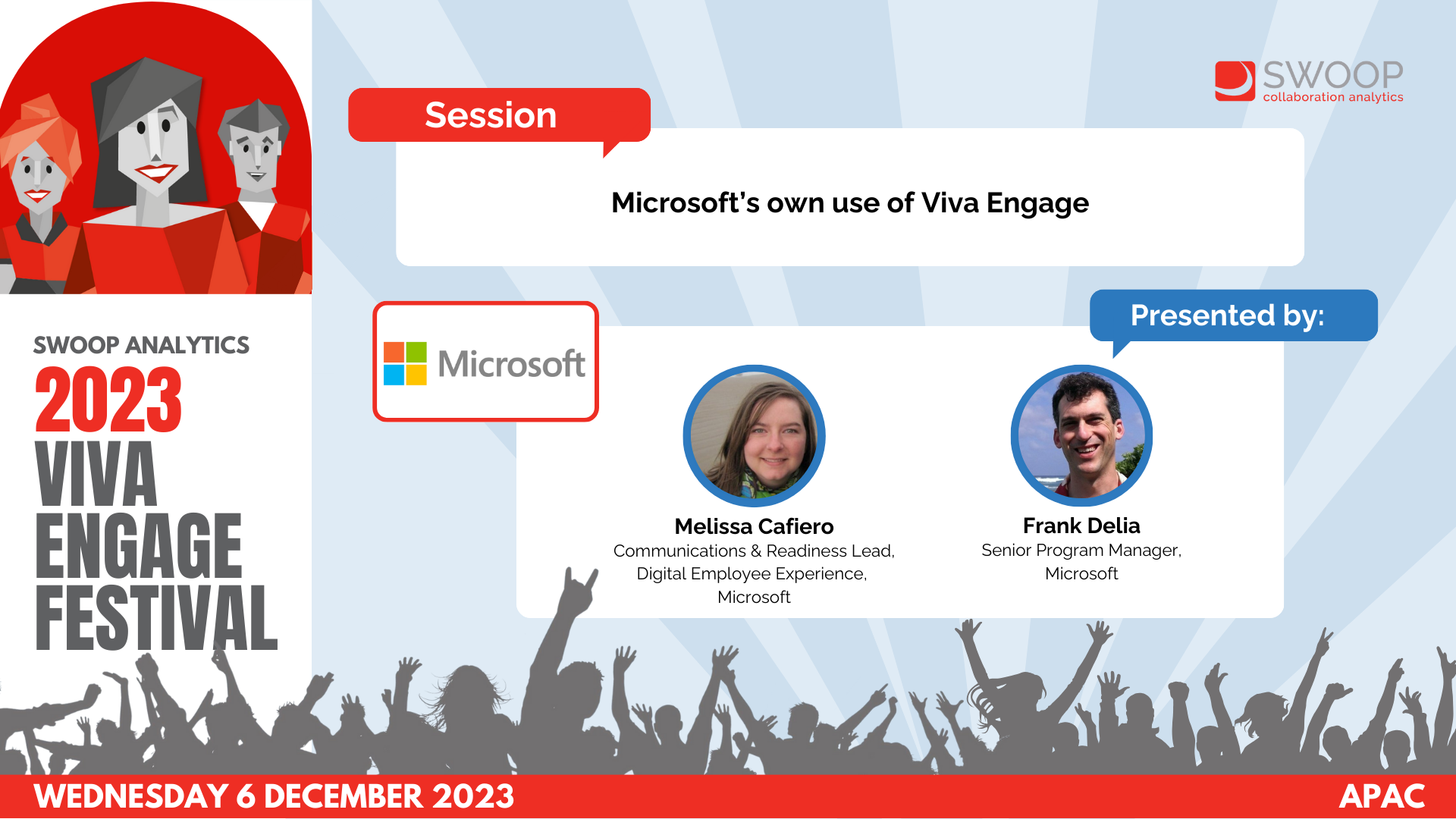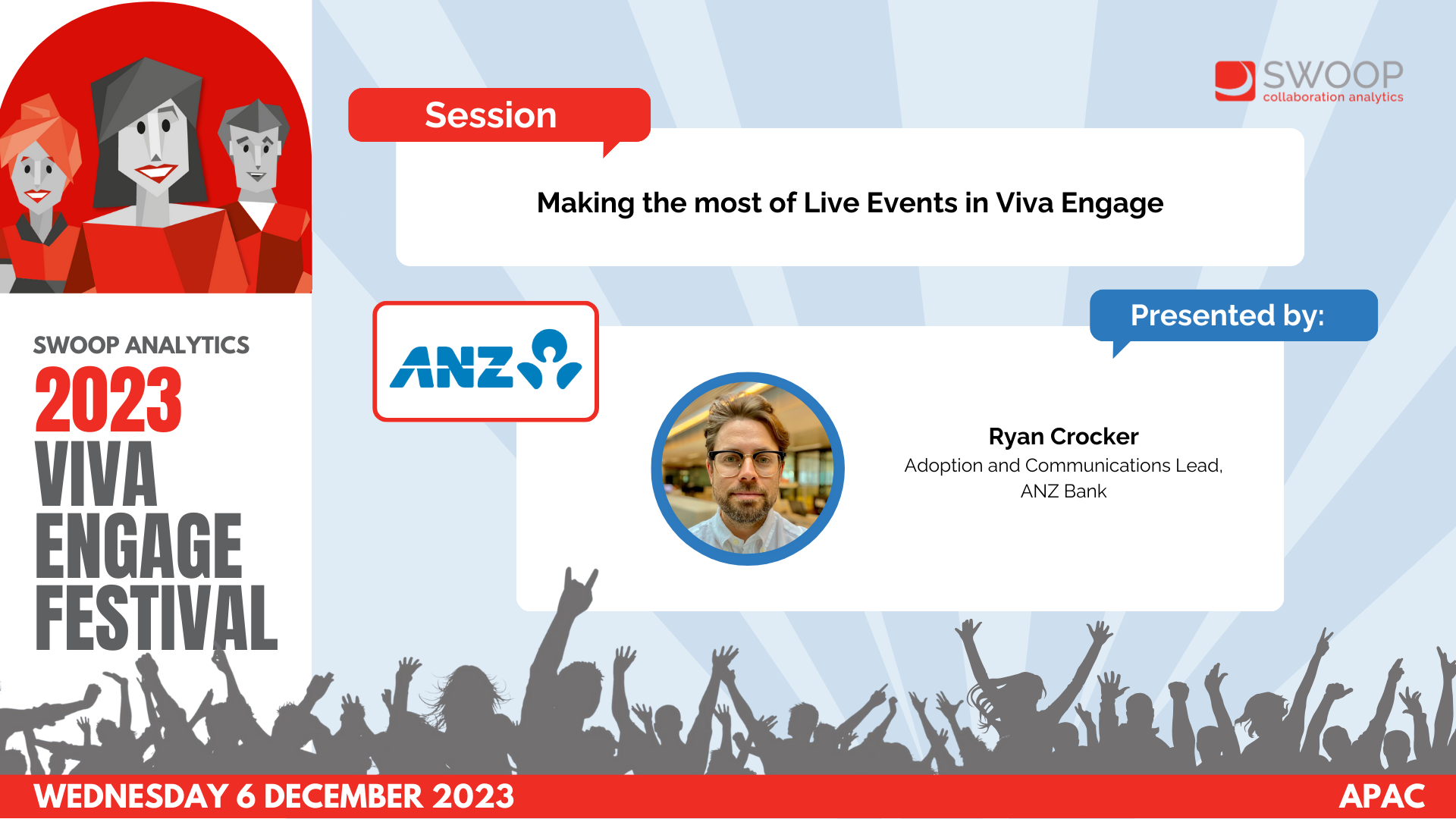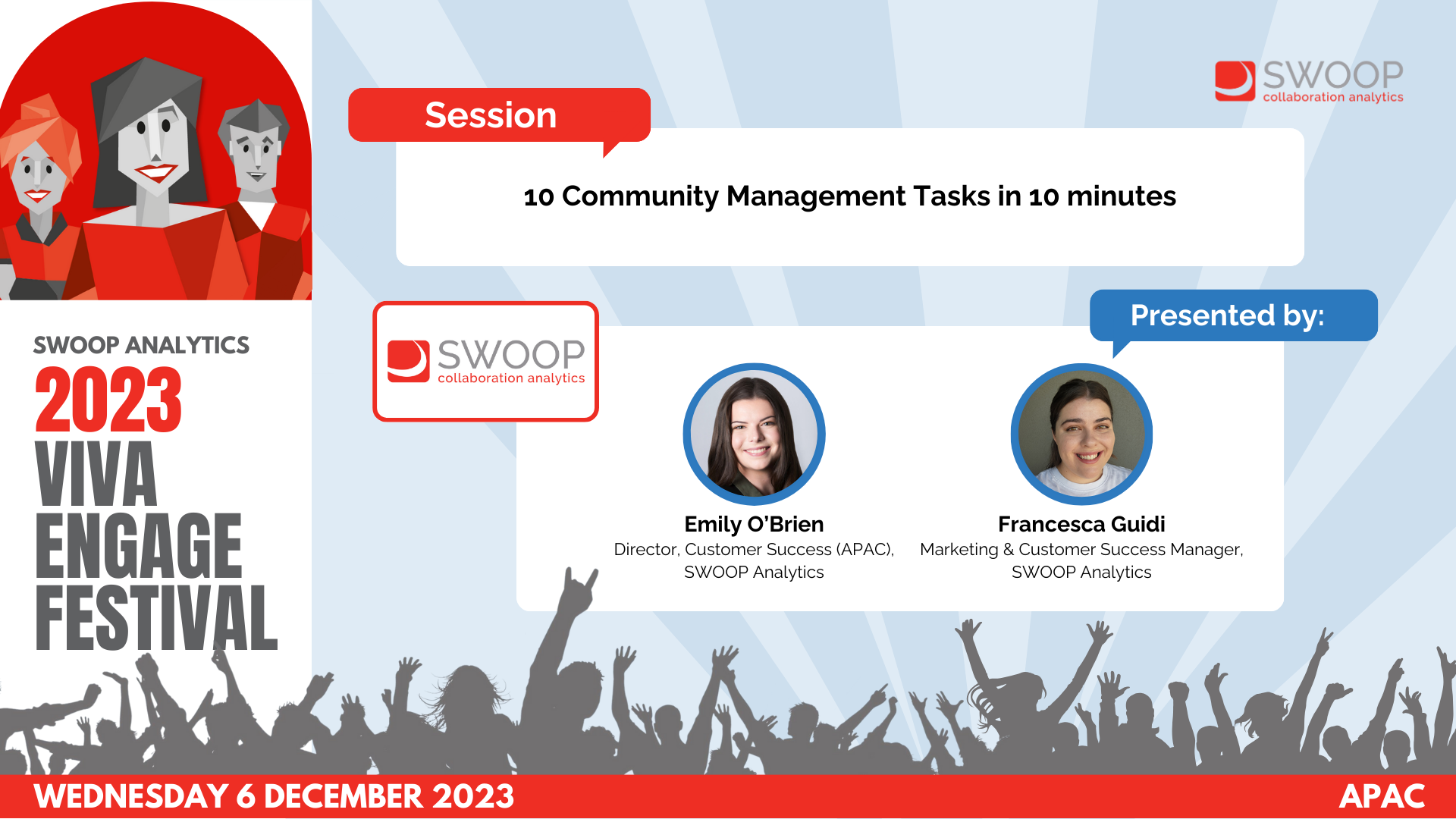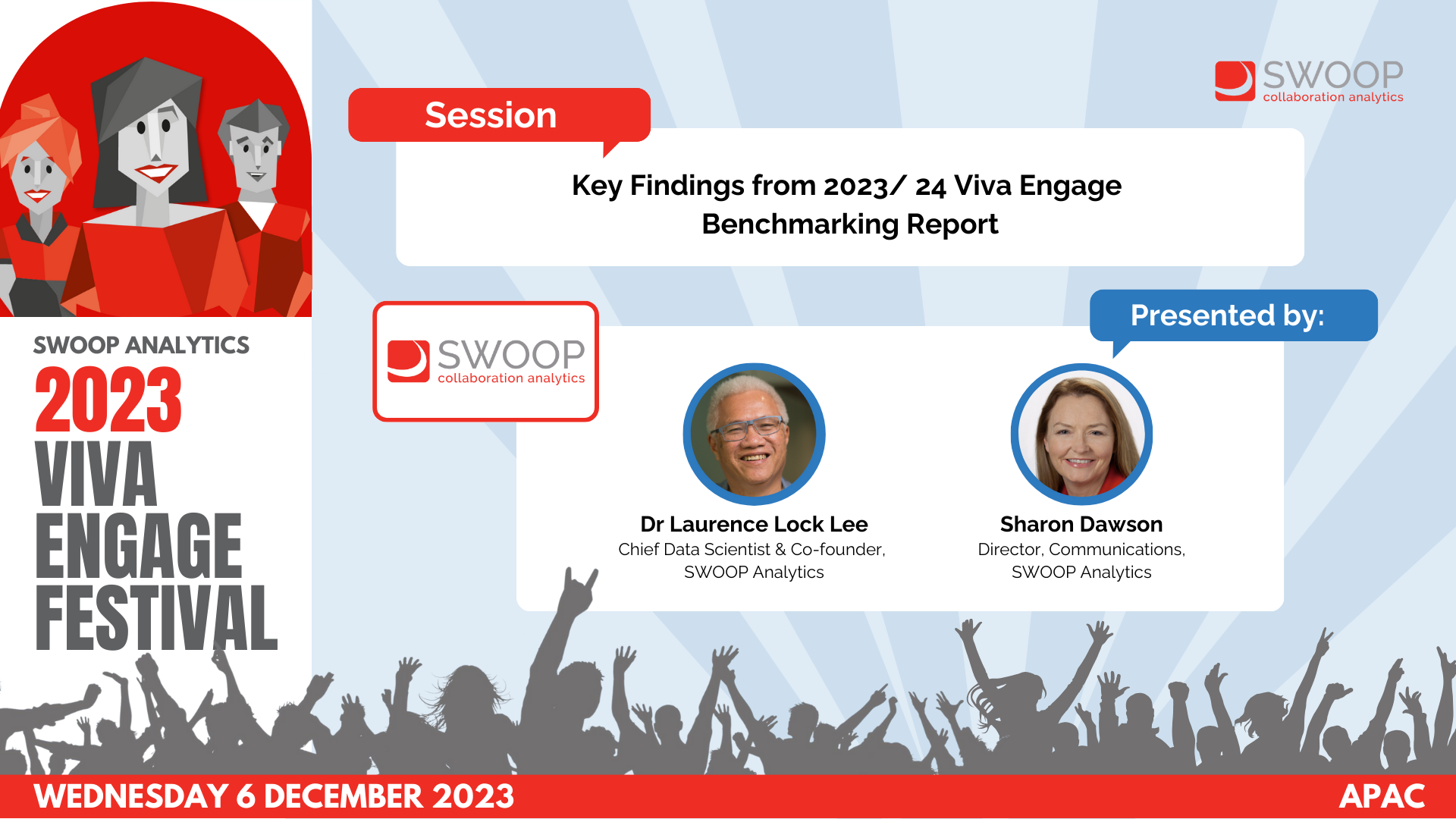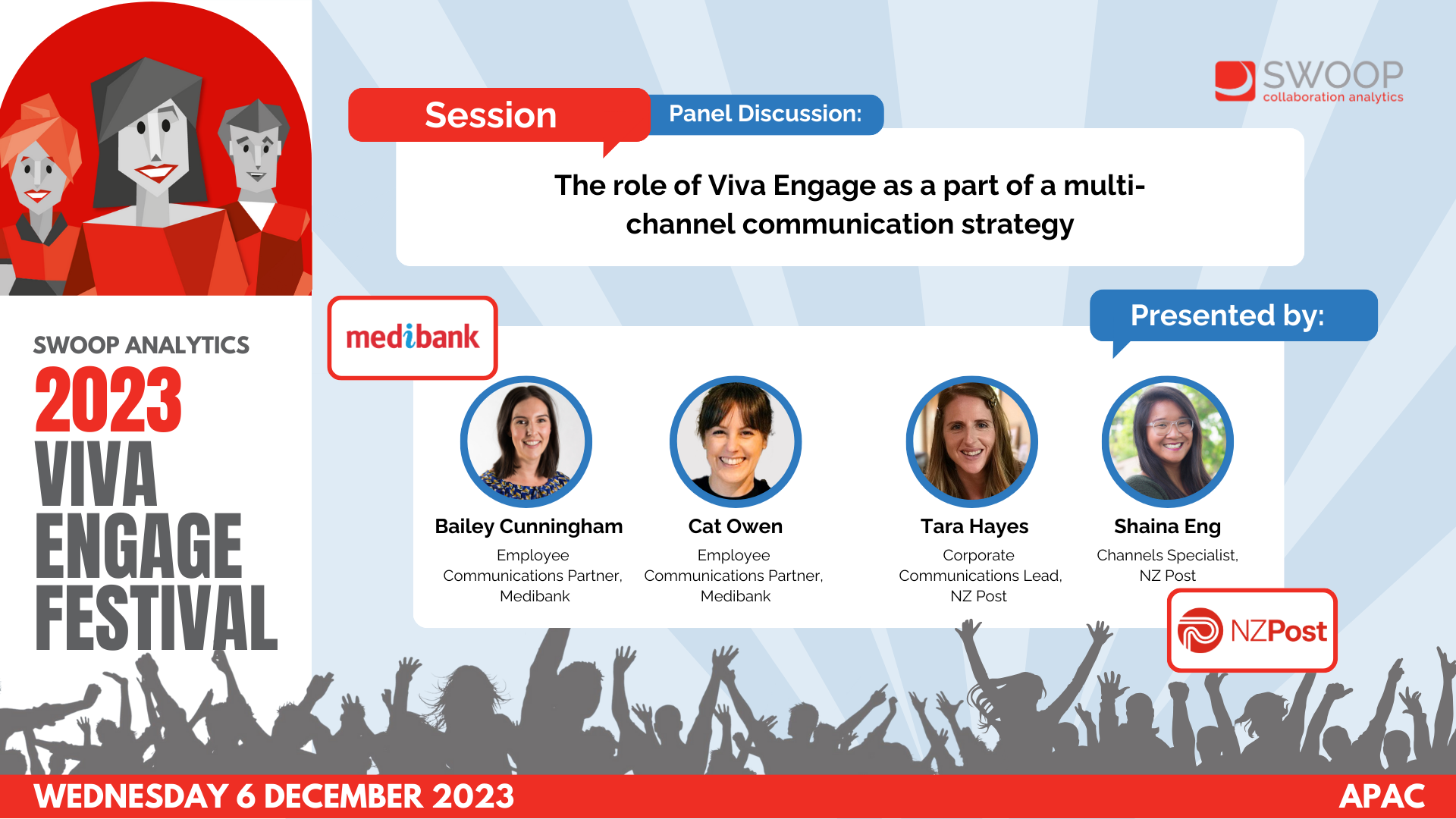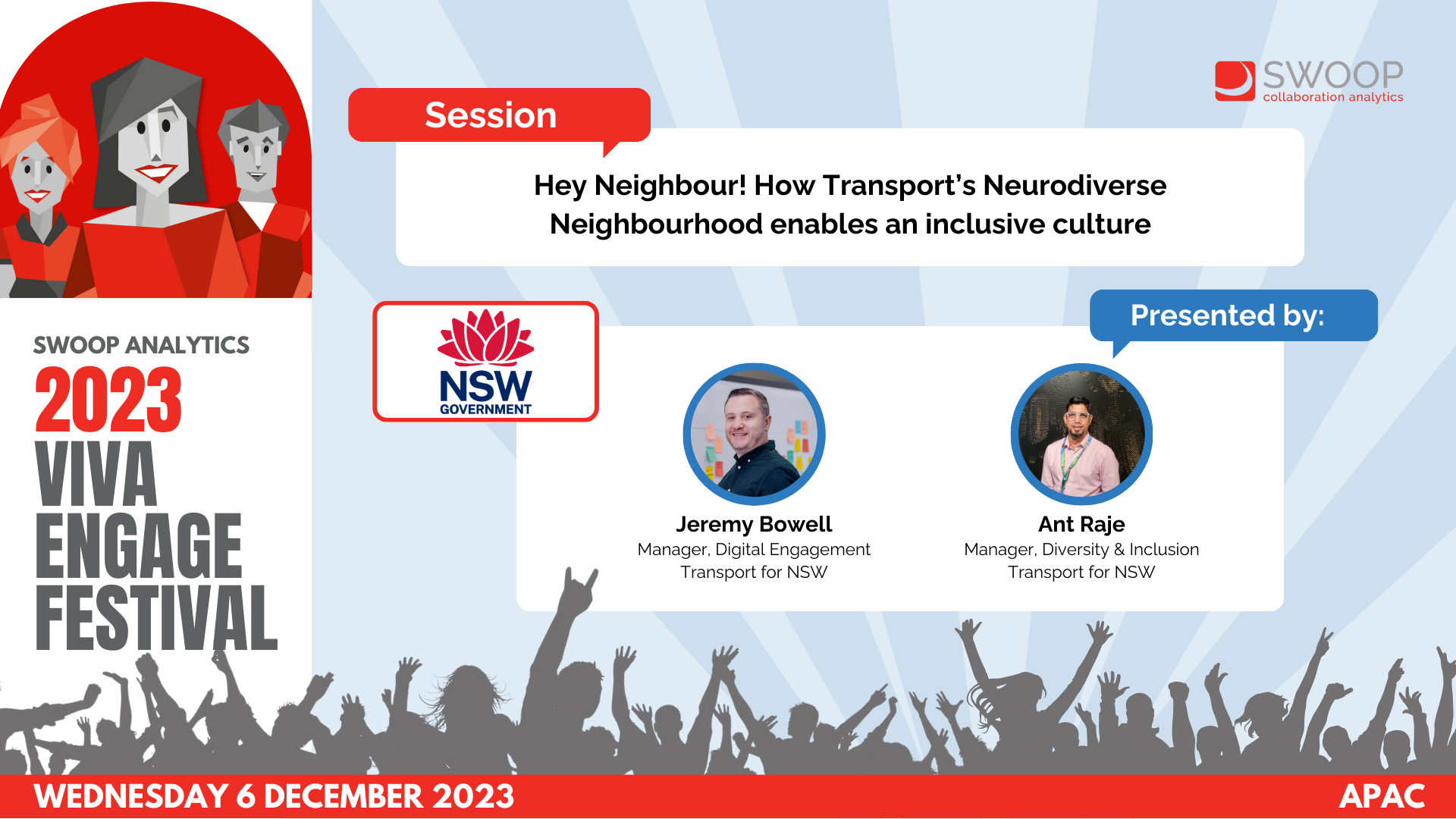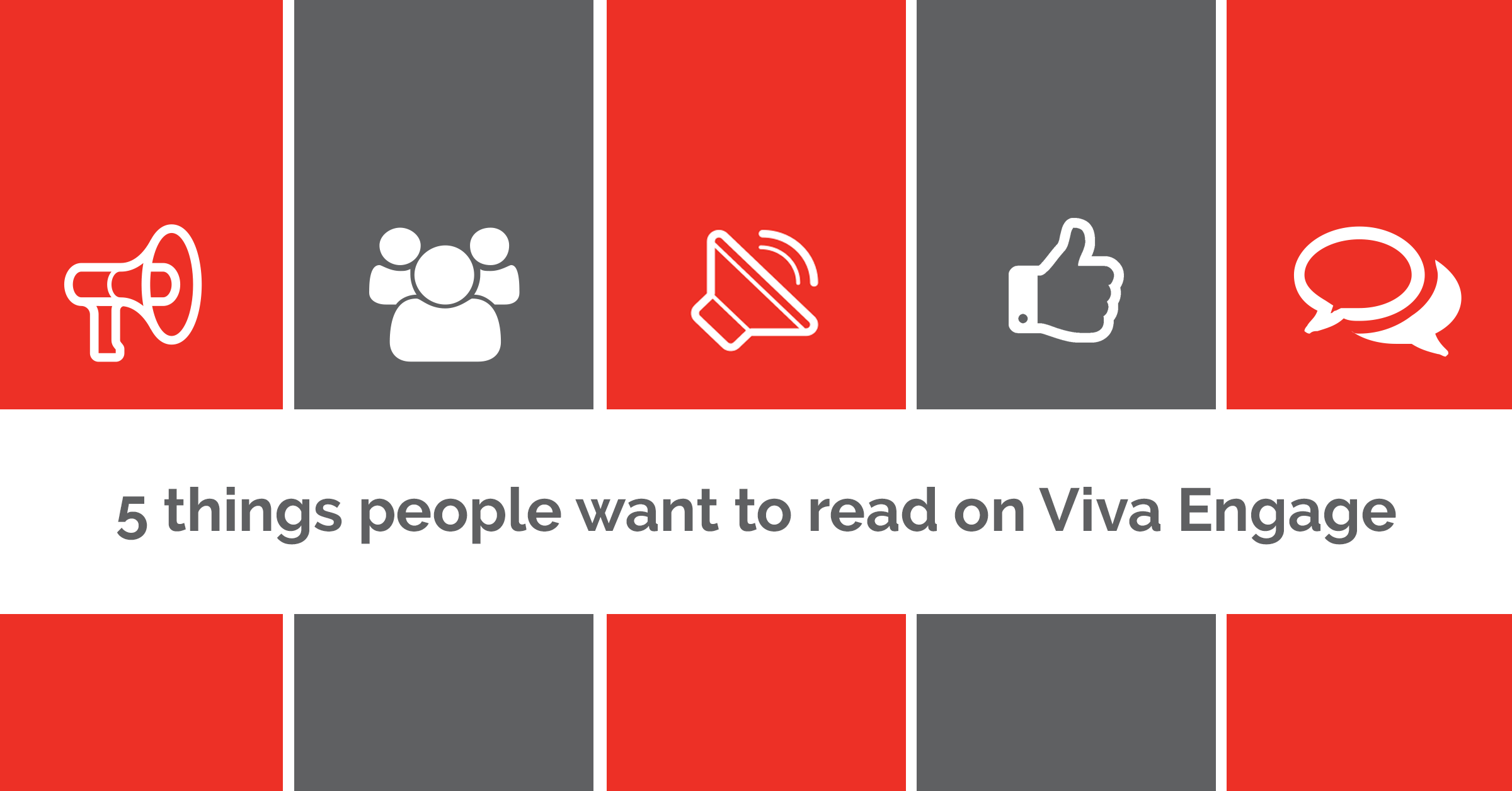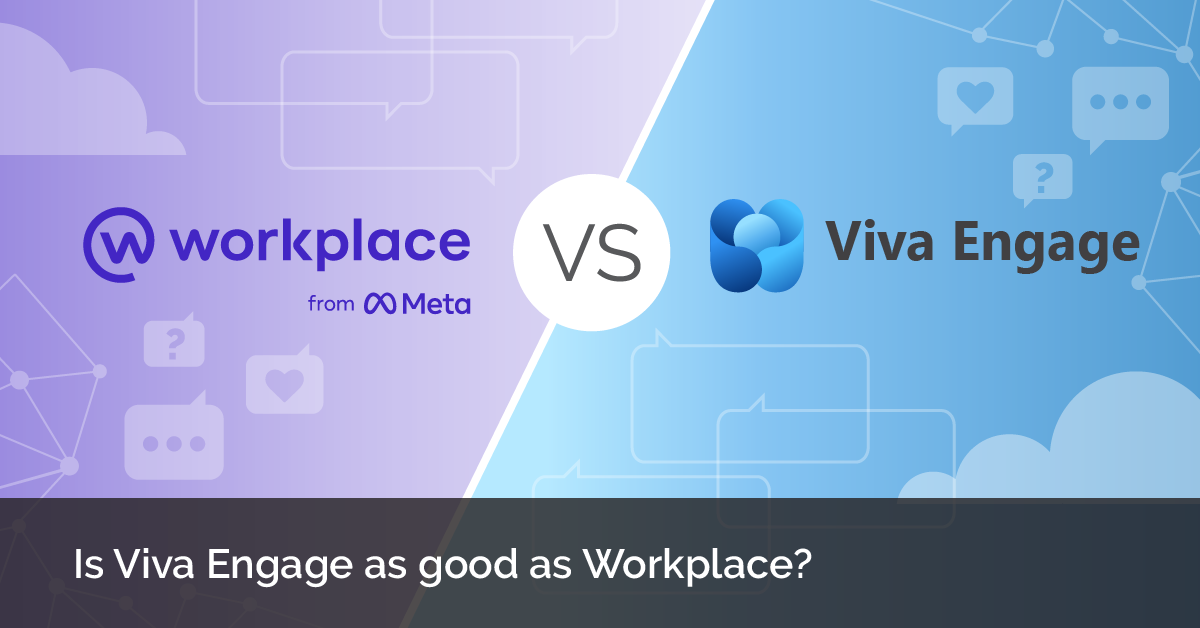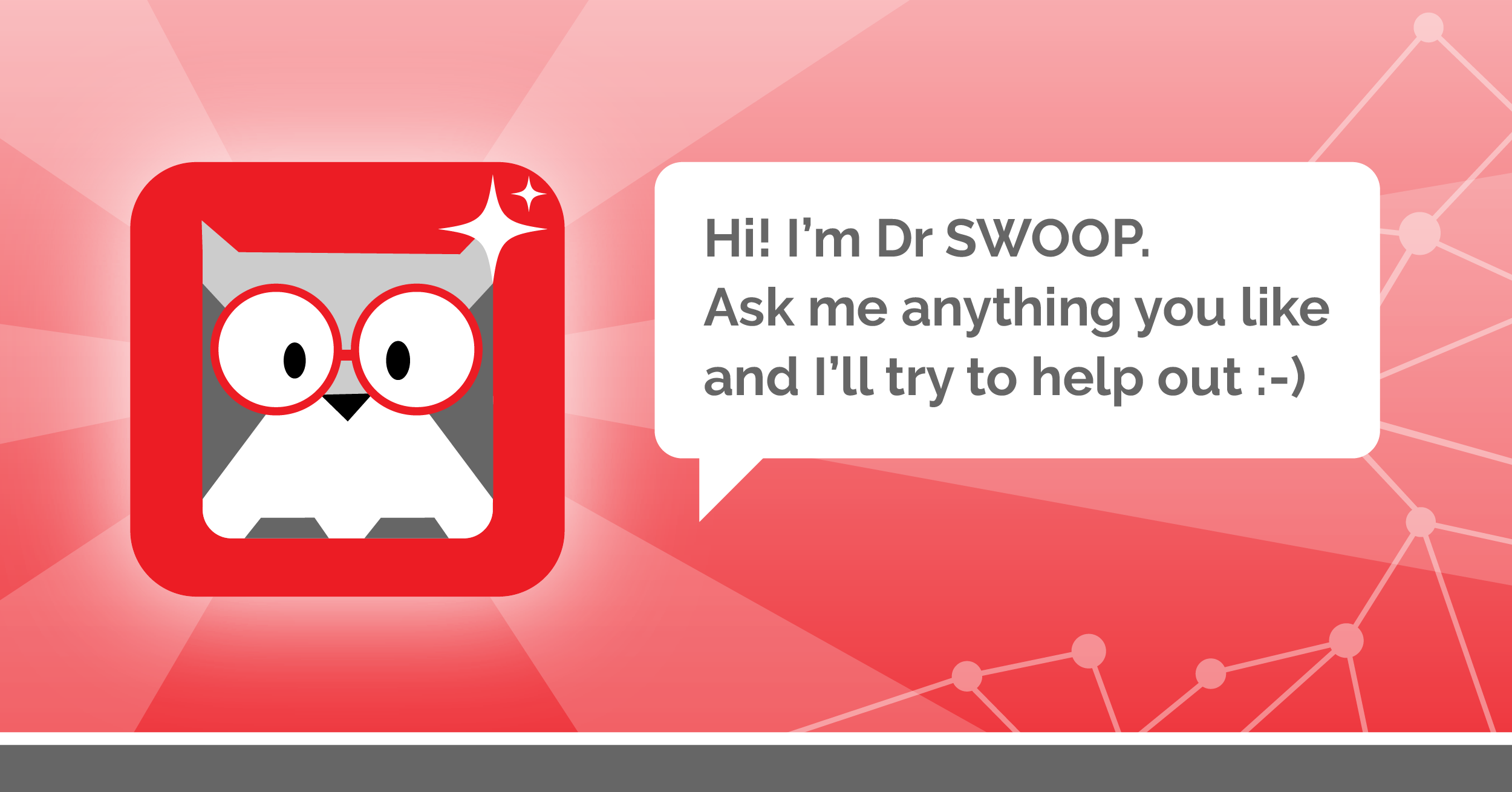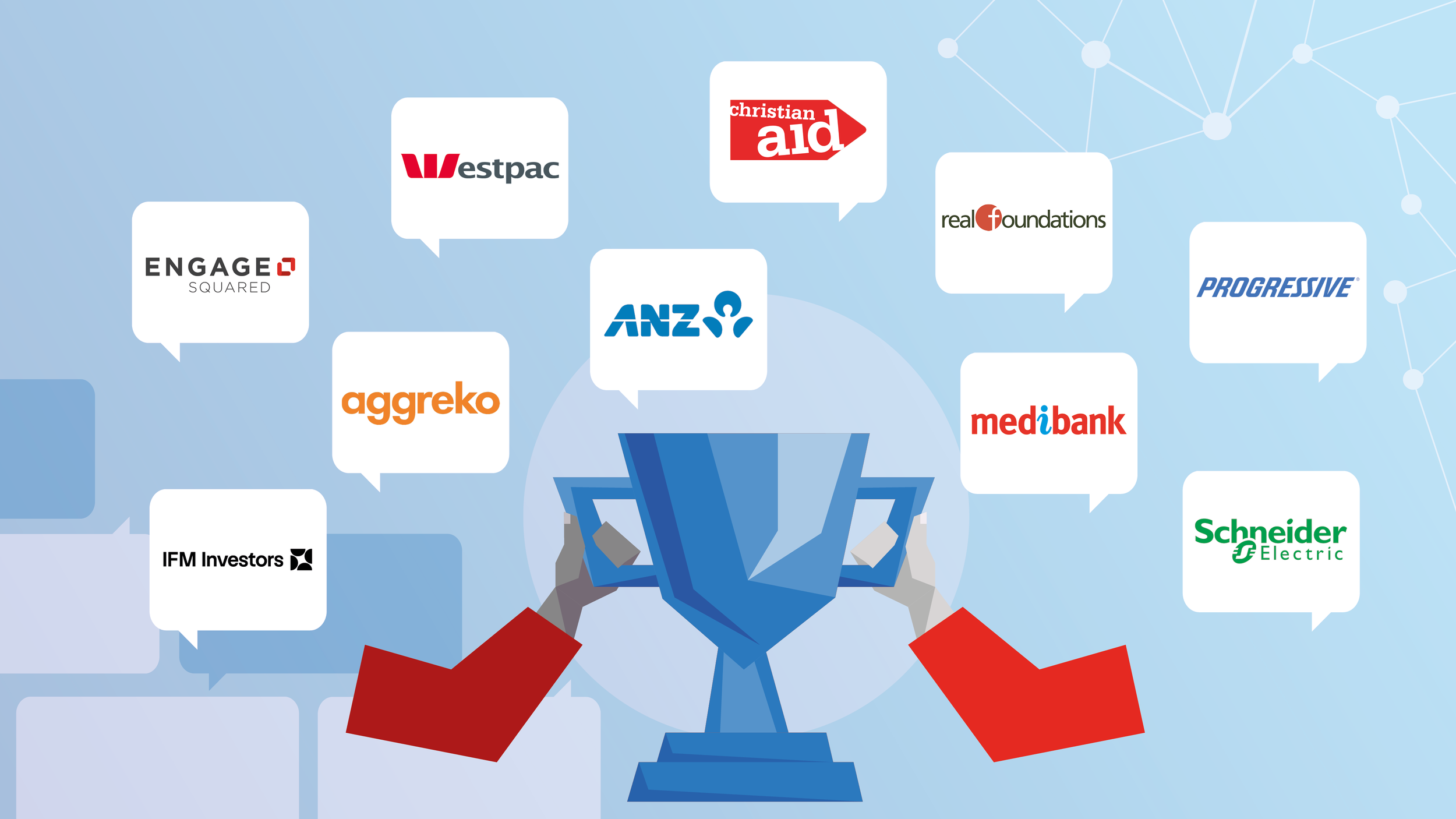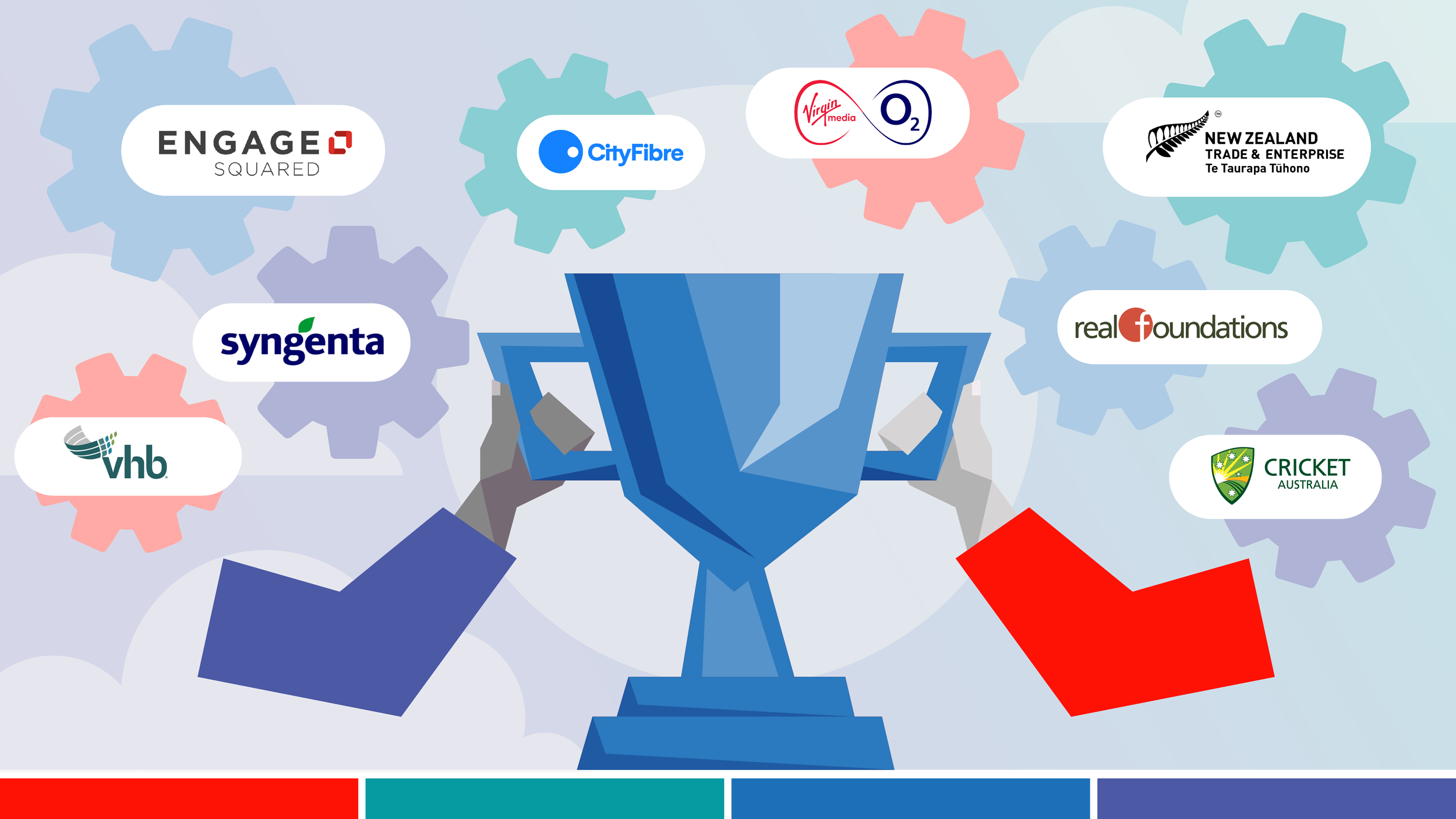Christian Aid: Governance as your Viva Engage superpower
EMEA | Viva Engage Festival 2023
Viva Engage is the heart of internal communication at Christian Aid, enabling fast, efficient and, most importantly, HUMAN connection for their people. Hear how a strong and well implemented governance framework is the key to their Viva Engage success.
-
To introduce our next speaker again briefly, before we get into the meat of it, the conversation. So this one's going to be a little different. Peter and I will have a chat.
So there's no slides in here other than this one to put a face and a name and a role to Peter, who is global internal comms manager for Christian Aid. And yeah, Peter, I've enjoyed lots of conversations with Peter and today his topic is focused on governance as your Viva Engage superpower. But we sort of will discuss a fair bit around that.
The first thing I want to just reiterate is it was mentioned earlier by Sharon in the Viva Engage benchmarking session. Christian Aid ranked number one in the small sized organisations in our benchmarking analysis and number two globally from the 97 organisations benchmark. So this is why I'm especially excited for having Peter here to share a little bit of insight into what is the secret sauce at Christian Aid? Why is your Viva Engage network performing so well to be number one for small size, number two globally? I've got a bunch of questions for you.
I'm going to actually stop sharing the screen. I'll ask a colleague if you're able to spotlight Peter and I if you haven't already done so. Cool.
Because we're going to just have a chat. And this way you can all see Peter's face. Well, Pete and Peter.
I guess we can differentiate with that R at the end of the name. Peter, just to just to get started, I'll ask you just to introduce yourself, your role and give a bit of a summary of what Christian Aid is all about. Great, thanks Pete.
Can you hear me OK? Yeah. I've also got a bit of a sore throat. So hopefully I'm coming across fine.
My name is Peter Berry. I'm the global internal comms manager for Christian Aid. What do we do at Christian Aid? We provide long term development and humanitarian relief worldwide.
We tackle injustice and we help to alleviate poverty. So that's what we do in a nutshell. We're a global organisation.
So we have offices based in Africa, Asia, Latin America, Caribbean and in the UK and Ireland. So for us, having a tool where we can effectively collaborate across regions and time zones is really important. Cool.
So I'd love to hear a bit from you on the background to this story, because you used Yammer a long time ago, but it didn't quite work out for you first time round. Is that right? That's right. I'll probably use Yammer in the past tense and Viva Engage in the present tense.
But Yammer failed spectacularly the first time I launched it in 2015. What I did is I launched it a bit like Facebook, without any structure and just assuming staff would follow each other, create groups and share useful things about their work. Unfortunately, there was little traction and only a few loud voices could be heard, mostly from UK based staff.
And then we started to notice a problem when hashtag Nando's was leading the trend on a work based platform. So this is when I started to think perhaps Yammer is not the answer. So we looked at SharePoint then and we used site feeds, but then they were very siloed and they didn't really support global collaboration either.
Email culture was ingrained and leadership was quite wary about having a social media platform. So it was back to the drawing board, but it was a good learning experience though. And so when you decided to revisit Yammer or Viva Engage, as it now is obviously, what lessons had you learned from that first experience? Quite a lot, quite a lot.
I mean, I think the first thing was to have a really clear strategy. We knew from staff that they wanted to have a greater voice in the organisation. We knew the staff wanted to connect to leadership and vice versa.
And we wanted to share knowledge and learning with colleagues across different countries. This we knew, but we had to have a clear strategy to make that happen. We also needed to have that leadership buy-in as well.
And so as part of that strategy, I developed an internal social media strategy, which was endorsed by leadership or certain sections of leadership, which then gave me the green light to push forward. We didn't need all leaders to agree, but just some. And incidentally, some of those that were most opposed at the start were the biggest proponents later on, which is quite something.
But I think for me, it really is about effective governance. I think this is really, really important for Christian Aid. You can't really be laissez-faire about Yammer.
And I noticed that from the first launch that I did. I had to be really tightly structured around our corporate priorities, requires very strong community management and integration with our other internal comms channels. So if we said we're going to use it, we had to push all our energy into it and use it as our primary corporate comms channel.
It can't be just an added extra hidden behind the scenes. And so you were clear that governance was a really critical success element. How did you actually approach that in practice? What did that look like? Well, we structured Yammer as it was then around our corporate priorities, strategic objectives and areas of work.
So, for example, we'd have a group on gender justice and then we'd invite all of our gender focal points into that group. We'd then focus, we'd have a group on the international department and then we'd invite every member of the international department into that group. All groups were created in a very systematic and planned way in consultation with stakeholders.
And these would only be authorized by internal comms. We wouldn't let staff create public groups. We also didn't really expect staff to join groups themselves.
So we mass invited staff to groups with an opt-out policy. In reality, no one actually leaves groups and also they have a vested interest in staying. So why would they leave? But sometimes people are quite reticent about doing that.
But I'm a big supporter of doing that. So it meant that we ended up having a very small number of strategic and high membership groups. And also the other thing was making sure that Yammer was our primary comms channel where we shared content.
And so we've only a small team of two people at Christian Aid. And our weekly newsletter, our internet homepage and other channels were merely used to curate the best bits from Yammer rather than having separate news. And I think that also really helped because it meant that despite having a very active Yammer group, it also meant that the big messages didn't get lost.
And I think the other thing was really having that sort of community management piece as well and having a communications plan working with each of the Yammer admins. So that was good. And the other thing for us which had a bit of opposition at the time was to send a clear direction to leaders not to send all staff emails.
In fact, they can't. Only internal comms can send all staffing emails and we only do that in an emergency. So nobody can send all staff emails except for us and we never do, very rarely anyway.
And so, and also anything that isn't posted in People Engaged just doesn't get promoted by internal comms. So that's an added incentive. Just on the leaders piece, I won't sort of ask for names of individuals or anything, but so you got some genuine pushback from leaders on banning the use of email.
Yeah. Yeah, that's right. Yeah, they didn't really like that idea because I think email is so ingrained culturally that in a way, perhaps also because email replicates the letter.
That's what it is. Electronic mail, that's what it does. And so I think it is, and it's not, at first it wasn't seen as an official communication.
It wasn't sent by email. And there was this sort of preconception that if you just click send, then suddenly it's received, read, and actioned, where in reality, that's not the case. Yeah, no, I think that's a really key point is, and telling leaders that, right, and saying to them, you know that when you send an email, that doesn't mean it's read.
Like there is a difference between sending and reading. So you were really active in setting the scenario for people and putting that governance structure in place. How would you say your role as internal comms changed as a result of that? I think it's changed.
I think it's partly due to how we communicate now, partly due to the channels that we use, but I think it's improved our role. I think that in a way, I've become more of an IC consultant for colleagues to post their own content. I mean, after all, they're the specialists.
And, for example, if there's somebody who's working on floods in Bangladesh, they're going to be working with those partners in that country. Of course, they're going to understand the situation much more than a generalist communicator like myself. So I'd much rather give them the tools to communicate effectively, and it gives a lot more impact.
And also, we don't really want communications to be the center of the story. If there is an emergency like that, then we want to ensure that the people in the communities have got the focus. And then also, it increases the user base.
So if you've just got comms posting, then it's just coming from me. But if you've got a whole network of internal communicators from different parts of the world talking about different things, talking to their own audiences, then it's going to be a much more dynamic and vibrant group. So in a way, we're no longer the copywriters or creatives.
It's a bit more about steering the ship. Yeah, yeah. And giving lots of different voices and perspectives is a really important part of the internal comms role now.
You're sort of lifting everyone up rather than trying to be the voice yourself. Yeah, exactly. I think there's a lot more in planning as well.
So, for example, at the moment, you might have seen they've got the UN climate talks in Dubai, COP 28. So what we'll do is we'll work with a whole network of people who are attending there, and they'll all commit to posting on Viva Engage on a different day, as the proceedings change, before, during and afterwards, include videos, updates, things like that. And then you have a whole community of voices rather than just internal comms doing a daily summary.
It becomes a much richer experience, I think. Yeah, nice. And how do you sustain the success that you've had with Viva Engage? That's a good question, actually.
We're quite lucky in a way that Krishna has, it does already have an active collaboration culture anyway. But you can always nurture better and more effective communication. People always post in the wrong community.
I've spent quite a lot of time moving posts into the right community. So, no, you don't put it there, you put it here, right? And then they will say, Peter Barry moved, and I have to explain why I did that. But I think, so it is known what group to post in, what audience, what time is appropriate.
So there is a constant supervision and community management. But I think once you've got that governance in place, and once it becomes entrenched in the organisation, people feel that interaction, people get the responses, they get the messages that come through. There can be that shyness at first.
I think also culturally, I think that there can be differences as well. I think that, and also differences in types of roles as well. You know, some people feel a bit more reticent about posting than others.
So it's really, for us, it's really about amplifying the voices and getting people that are much more behind the scenes and giving them credit for the work that they do. And once they've posted once or twice, and they've had that positive reinforcement, they tend to carry on. Yeah.
And in terms of managing the communities, are you sort of quite hands on on that? Or how do you get involved with managing communities? Yeah, it's not that difficult. I think keeping to a small number of large groups, deleting groups you don't use, amalgamating groups. And using SWOOP is really helpful for this as well, actually, because you can start to see the communities which have that traction, and then we can push those.
It's much better to have a smaller number of large active groups than have a huge number of groups. And I think ensuring the internal comms owns the groups, and we will only authorise groups that get set up. And because it revolves around our priorities and work, then generally, we don't really have that sort of proliferation of groups that we might would never really have had.
Yeah. But I think SWOOP has also helped us, not only with the most active communities, but it's also showed one of the most red pieces for internal comms, the effectiveness of hashtags. So I think that I mentioned about COP, while some people may post in the climate group, some people may post in the international group.
So it's just a way we can bring things together and link to that on the homepage or newsletter. And yeah, I think SWOOP really sort of shows that those things do work. But staff aren't really going to know without instruction how to write topic feeds, how to write topics.
That's something where we have to step in. So you can't just let it go. We have to.
In terms of that stepping in and advising or teaching staff, how do you communicate the rules of engagement to your people? It's something that we have linked. Yeah. We do have a page for ground rules that are linked on every Yammer community.
And also when people become an admin, they read them and when they start, they read them. But to be honest, I'm not sure how often they get read, but we have created them. And I think it's important to base them around your values, whatever your core values are in the organisation.
So at Christian Aid, we have four values, which are dignity, quality, justice and love. And so if you act in accordance with those values, then you can't really go too far wrong, can you? I mean, people, we have quite an active network and full of very passionate people. When you're dealing with injustice, then you are going to have very passionate people.
So people do have disagreements. But as long as people act in accordance with those values, it's fine. But what I would say is that it's really important to have a scenario plan, even if you've never had to use it.
So we've never had to use it. But if anything bad did happen, so say, for example, there's something discriminatory or somebody got upset at work, something like that, then we'd have to make sure that there would be a scenario plan in place. So we've got a flowchart.
So if X happens, then we would speak to them. We could get referred to HR and things like that. But I think sometimes it's worth taking things offline and having a chat.
If people disagree on Yammer, then maybe it's not best to carry on chatting. It might be better just to sort of, you know, have a cup of coffee or something and talk about why you felt differently about something. Yeah.
And I love your point around everything connects back to your values. Right. And yeah, it's if you've got that as kind of a guiding star, I guess, then you can always sort of resolve differences and come together and reach a place to move forward healthily.
Right. So what improvements are you focused on next? I mean, you're number one for small organisations worldwide. You're number two in the world.
Are you like dead set, laser focused on we want to knock ANZ Bank off the top? We're going to be number one. What are your thoughts on improvements that you're focusing on next? Yeah. Loads, actually.
I mean, I must say we were really delighted to get the to get the award, but we do feel that there's still some way to go. We still feel there's a lot to go because I think as an organisation, we're doing well, I think. But I do see pockets in the organisation which need improvement.
So when I looked at your top influences score, so I've sort of expanded to like the top hundred, but even the top 20, I can see that there are more people who are UK based in that community rather than globally. And so there may be people who are French speaking who don't appear there on that list, for example, or there may be people who work on our country programmes who deal more directly with people in need who may not be in that group. So I can see that there's definitely some work that we have to do in our team to ensure we can raise those global voices and ensure that it's a representative community and to improve our collaboration more globally, I think.
Nice, nice. And to sort of finish, because we are very close to time, what impact has your focus on governance had? How would you sum that up? I think it's probably made us feel more collegiate, it's made us feel like more one Christian Aid, one organisation. So when you have one platform that brings everybody together, no matter where they're based, what rank they are, what role they are, what time zone they're in, it's a real leveller, actually.
And so when you had an email in a sentence, an official record by a director at a certain time, and you were a passive recipient, there wasn't that sort of level of engagement. And so I think now anybody can interact with everybody else. I think that's a very powerful thing.
Nice. Peter, it's been a pleasure getting to ask you some questions and to tap into just a little bit of the sort of magic and the thinking behind the success you're having with Viva Engage at Christian Aid. And I think it's important to point out, yes, it's very worth us saying, look, celebrate winning the awards with SWOOP.
Celebrate the fact that you've got this really high performing network. But the biggest thing is that it's adding value to your people every day using Viva Engage is adding value, you're clarifying communication, you're getting a better level of understanding and dialogue happening across the organisation. So it is really inspiring for me as a practitioner.
I'm sure that for lots of people on the session today, just listening to how you've thought about this and approached it, you will have sparked a lot of thoughts for people. As I've been asking questions, I have not been paying any attention to the chat or the Q&A. I might just pick on one of my colleagues.
So Peter, question is, how do you manage the ask for people to provide updates from events like COP? For example, getting them to post internally to Viva Engage as well as posting on sources such as X? That's a good question. Really good question. I think what we need to do is have really effective comms planning.
So we know that COP is going to happen. And so what we need to do is ensure that on each day we have somebody who commits to posting on Yammer a particular day. And then we know in advance what they're likely to post.
But if we don't, because something like COP you don't always know, but you know that they'll at least write a summary or at least write an update. When you have a day where somebody different is able to contribute and that's agreed in advance, then you know they're able to report back. I think having strong relationships, the way that internal comms works at Christian Aid is we work close to the corporate.
We're in the corporate side near the CEO's office, but we do have very close relationships with digital and external comms. So obviously we need to make sure that whatever is posted on X Twitter is also used internally as well. Cool.
I'm taking the time to look at the Q&A and I see there's a question from Ben Nielsen saying, Peter, we have a similar setup here with communities for specific topics, but it feels like people ask for permission to post in the right community. So they're coming to internal comms to ask where should this go? We'd probably prefer colleagues having a go. And then if we have to move posts around, that's fine.
Any tips for dealing with a permission based culture? I think, yes, I think that it's, I suppose it's the reason is that knowing where to post is the question or having the confidence. Well, yeah, more about the confidence of people. So people by default seem to be seeking permission from internal comms of am I allowed to post this or where should I post this rather than just trying it and then internal comms kind of managing after the fact.
Yeah, we sort of tell people to post and then because it's their role, it's their job to do it. So if their job is to, say, for example, their role is to work on, say, for example, their health adviser or gender adviser will say, well, we've got this event happening. Please, can you post on this date? And then if they say that if they're not able to do it, we'll say, well, please, can you ask somebody on your team to do it then? Because it needs to be done.
So, you know, at the end of the day, it's in their interest to communicate their area of work. So. And we often find that once they've sort of crossed the river kind of and made that first post, then they come back and they can do it much more easily.
Yeah. Yeah. It's that first taste of the response you get is so important, isn't it? And actually, I've just seen Matt from the SWOOP team has suggested in response to that to set up some social communities, give people space to practice with low personal risk.
So I think that's another great point around that. But what sort of implicitly giving people permission to post and telling them it's OK, just go and post. You can't you can't kind of say that enough, can you? Just to go post, give it a go.
And then people have done it that first time. Yeah, exactly. And I think you can also if you get to a point where the community is active, they start to see that by posting they get those responses.
But sometimes people don't have that confidence. They feel that what they have almost isn't valid or they don't think that why should they be alerting people to a particular thing? But whatever people post is going to be of interest to somebody across the organisation. It's all about sharing, learning.
And I think when they get that positive feedback loop, then it'll be really helpful. So, yes, I mean, when I say telling, I don't mean in a sort of, you know. Yeah, I mean, yeah, it's sort of supporting them and strongly supporting them to do it because it's in their interest and it's in the organisation's interest.
Nice, nice. Peter, there's a couple of other questions in the Q&A if you did have time to jump in and have a look at those and add your two cents in response to those. I just want to wrap up by saying thank you so much for taking the time to share a piece of your story.
And yeah, thanks for your continued work to make Viva Engage a real success and have it adding value. It's always a pleasure to hear of Viva Engage adding real value to organisations, especially organisations with such a fantastic purpose like Christian Aid. So thank you very much for your time today.



